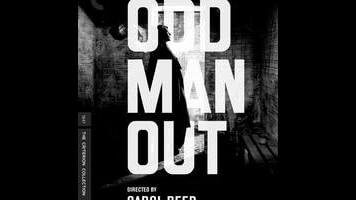Decades ago, movie posters were a lot more aggressive, relying not on blurbs from critics but on breathless praise whipped up by the studio’s marketing department. One poster for Carol Reed’s 1947 noir classic Odd Man Out, for example, proclaimed it, “The most exciting motion picture ever made!” and “An adventure in unbearable suspense!” One can’t exactly call these lies, since it’s all subjective, but Odd Man Out’s greatness arguably lies precisely in its lack of conventional suspense and excitement. It’s a film that casts James Mason—Britain’s biggest movie star at the time—in the lead role, then perversely chooses to incapacitate his character right off the bat, leaving him mostly or entirely unconscious for the duration. He’s the passive fulcrum around which a bevy of reactive dramas pivot, collectively providing a portrait of an entire community. Occasional hints of danger are overshadowed by complex negotiation.
Opening with a disclaimer stating that the film is unconcerned with the law or politics (“only with the conflict in the hearts of the people when they become unexpectedly involved”), Odd Man Out deliberately avoids specific references to the Irish Republican Army, which is referred to throughout only as the Organization. Nonetheless, it’s clear for which group Johnny McQueen (Mason) works, even if he now, after a prison escape and six months in hiding, seems more interested in compromise than in insurrection. Following a botched robbery, Johnny falls out of the getaway car and, badly wounded, has to fend for himself for the rest of the movie, with help and hindrance from various ordinary folk he chances to meet along the way. These include a couple of sweet old ladies (Ann Clery and Beryl Measor) who take Johnny home, mistakenly thinking he was hit by a truck; a cabbie (Joseph Tomelty) whose salt-of-the-earth friendliness has its limits; and a wild-eyed painter (Robert Newton) who finds Johnny the ideal (passed-out) audience for his philosophical monologues about the division between body and soul.
Odd Man Out generally gets filed under film noir, which makes sense from a purely visual standpoint. Reed and his cinematographer, Robert Krasker, would go on to make The Third Man together two years later, and they’re working in a similarly atmospheric mode here; the movie (shot in monochrome, mostly at night) is all pools of light piercing deep shadows, and looks superbly silky in its new Criterion transfer. There’s a certain amount of noir’s fatalism, too, especially when it comes to the ending. But the bulk of Odd Man Out is too determinedly ordinary—in the best possible way—to fit comfortably in that moody, cynical genre. Structurally, it’s not unlike last year’s superb Two Days, One Night, in which Marion Cotillard ran around trying to talk her co-workers into giving up their annual bonus so she could keep her job. Here, the people Johnny encounters don’t know him, except by reputation, but each one likewise has to make a decision about whether or not to help, taking into account that helping him may well cost them.
What’s truly remarkable is the extent to which all of this happens without Johnny’s active involvement. Mason is magnificently feeble in the lead role, which is about as far removed from a typical movie-star part as one could imagine; he selflessly allows a host of bit players (many of them culled from Dublin’s Abbey Theatre) to take the spotlight while he slumps in the background of scenes. What’s more, as scholar John Hill points out in a 25-minute video interview included in the Criterion supplements, the film is more pointedly political than its opening disclaimer pretends. There’s a world of bitter truth contained in the cab driver’s parting admonition to Johnny, after he realizes who his passenger is and quickly dumps him in a random location, not wanting to stick his neck out any further. “If you get back to your friends,” he tells Johnny, “you’ll tell ’em I helped you. Me, Gin Jimmy. But if the police get you, you won’t mention my name, huh?”
Odd Man Out is available on Blu-ray and DVD from Criterion.




















![Rob Reiner's son booked for murder amid homicide investigation [Updated]](https://img.pastemagazine.com/wp-content/avuploads/2025/12/15131025/MixCollage-15-Dec-2025-01-10-PM-9121.jpg)




















